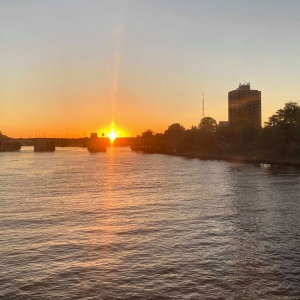The Stream, October 20, 2021: West Virginia Faces Significant Risk From Flooding, Data Reveals
YOUR GLOBAL RUNDOWN
- New data reveals West Virginians will disproportionately suffer from flooding as climate change worsens.
- A recent analysis shows the impact of agricultural runoff on U.S. waterways.
- Iraq will cut its crop planting area in half this year due to drought.
- Michigan’s State Senate is investigating the governor’s handling of a lead water crisis in Benton Harbor.
An aging canal system along the U.S.-Mexico border could significantly increase water shortages in the region in the coming decades.
“As this region continues to become drier due to climate change, water supplies will be greatly reduced.” – Guy Fipps, a professor of irrigation engineering at Texas A&M University. An aging system of over 2,000 miles of pipelines and canals along the Rio Grande on the U.S.-Mexico border are losing as much as 40 percent of the water they carry, the Associated Press reports. As climate change intensifies drought and population grows throughout the region, water shortages could worsen in the coming decades. The leaky canal system has long been seen as too expensive to overhaul, but experts say that even now, demand for water exceeds the river’s supply.
IN RECENT WATER NEWS
In Case You Missed It:
HotSpots H2O: As Famine Looms in East Africa, Humanitarian Groups Call for Urgent Action – Drought has left millions in the region facing food insecurity – and conditions are expected to get worse.
What’s Up With Water – October 18, 2021 – This week’s episode covers garbage and high levels contaminating South African rivers, an agreement between Israel and Jordan extending their long record of water cooperation, a province in China hit by major flooding, a new study that has identified major infrastructure systems that are vulnerable to rising waters in the United States.
West Virginians Will Suffer The Most From Flooding, Data Shows
West Virginians will suffer disproportionately from flooding as climate change intensifies. New data from The New York Times reveals that most residents in the state will not be able to relocate from the waterways that threaten their safety. The report comes as Joe Manchin, a Democratic Senator from West Virginia, has rejected any plan to move the United States away from fossil fuel.
TODAY’S TOP WATER STORIES, TOLD IN NUMBERS
72 STREAMS
A recent analysis of nitrous oxide production in 72 streams across the United States found that in streams where denitrification efficiency is low, more N2O is released. Matthew Winnick, the author of the study and a professor of geosciences at the University of Massachusetts Amherst, told WWLP that enormous amounts of nitrogen-rich chemical fertilizers used in agricultural fields are changing the way nitrogen moves through the environment. The study found that stream restoration solutions could increase the capacity of certain streambeds to process nitrogen, reducing greenhouse gas emissions.
50 PERCENT
Reuters reports that Iraq will reduce its 2021-2022 winter crop planting area by 50 percent. Iraq’s agriculture ministry said this week that available water in dams and reservoirs will only be able to irrigate around 250,000 hectares of land. The move comes amid an ongoing drought in the Middle East.
ON THE RADAR
The state Senate in Michigan is asking for emails and other documents from Gov. Gretchen Whitmer’s administration related to officials’ handling of lead contamination in Benton Harbor, MLive reports. Attention on the issue within the Senate, which is controlled by Republican representatives, escalated last week after a Detroit News story revealed state efforts to tweak the city’s water treatment rather than tell people the water wasn’t safe to drink. The Senate has asked that their request be fulfilled by October 28.
Jane is a Communications Associate for Circle of Blue. She writes The Stream and has covered domestic and international water issues for Circle of Blue. She is a recent graduate of Grand Valley State University, where she studied Multimedia Journalism and Women, Gender and Sexuality Studies. During her time at Grand Valley, she was the host of the Community Service Learning Center podcast Be the Change. Currently based in Grand Rapids, Michigan, Jane enjoys listening to music, reading and spending time outdoors.







Leave a Reply
Want to join the discussion?Feel free to contribute!